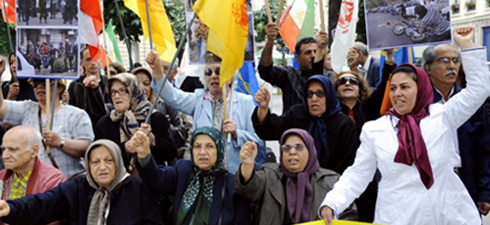The Persian pop song fades, then the tech lady flips the switch for the news jingle. It’s noon here in the Strasnice quarter of Prague, in the Radio Free Europe/Liberty building, more precisely in the studios of Radio Farda, the broadcaster’s Iranian programme. There is really only a single top story today: the nation’s spiritual leader Ayatollah Ali Khamenei is speaking at the University of Tehran. And the world is awaiting his speech with bated breath. Millions of Iranians have been taking to the streets for days now. Which way will the nation’s strongman go?
The newsreader recaps what Khamenei has been saying thus far. Then two editors comment on his statements, interspersed with snatches of the livecast speech. The broadcast runs for about 20 minutes, then Javad Kooroshy emerges, takes a deep breath, and flits back into the newsroom. The 65-year-old radio editor is an old hand. “I’ve hardly slept for a week now, we’re on the air round the clock. We haven’t had this much hope in 30 years. Millions of young people in the streets, peaceful, but tenacious. It’s simply fascinating,” the excitement fairly gushes out of him.
Radio Farda has now taken on a new and vital importance for Iranians. “The regime is making massive attempts to jam reception,” explains chief editor Abbas Djavadi, in charge of the broadcasts to Iran, Afghanistan and Central Asia. “But we can be heard on medium and short wave. Though the censorship is ever-present. The first victim was the SMS connections, which were completely stopped. But we set up telephone lines via Skype. People are reporting on what’s going on in their cities, so we’re receiving pieces of the puzzle that fit together on the programme to form an overall picture. And they show there’s just no way these protests can be reduced to Teheran and intellectuals and students. The whole country’s rising up.”
Javad Kooroshy has jotted down some notes. Now and then he glances up at one of the large-sized photos on the walls: of Ayatollah Ali Khamenei. A picture that exudes optimism. Khamenei’s speech, on the other hand, which Kooroshy is following, is becoming more and more ominous. The editor-in-chief walks over: “Doesn’t look good. The signal Khamenei has given means attack. He’s not going for compromise, he’s going for confrontation. And he has attacked our station again, calling us an American propaganda machine.” His big brown eyes have lost the lustre they had an hour ago when talking about the protesters, their desire quite simply to live ordinary free lives in a country that is emerging from its isolation. “The people really don’t want much. They simply want a better life. Of course there are some particularly enlightened individuals who want to get rid of the Islamic Republic. But that’s not on the agenda. And it’s not about the nuclear programme either, people don’t care about that.”
Editor Kooroshy doesn’t see the situation quite as bleakly as his boss does. “Even if this youth movement should end in a blood bath, if they don’t achieve what they want – what we’re experiencing now is a milestone in the history of Iran. Our country could ultimately become a role model of democracy in the Islamic world. I was already ready to make the break, would’ve gone to Teheran at a moment’s notice if someone other than Ahmadinejad had won the elections.”
Now Kooroshy is going to stay at the station for the time being. And together with his colleagues, he’ll keep the steady flow of information and commentary going, but above all the excitement, the hopes and fears. “You can stay away as long as you like,” he says, “but the heart always beats for the home country.”
Was this article useful? If so we are delighted!
It is freely available because we believe that the right to free and independent information is essential for democracy. But this right is not guaranteed forever, and independence comes at a cost. We need your support in order to continue publishing independent, multilingual news for all Europeans.
Discover our subscription offers and their exclusive benefits and become a member of our community now!












